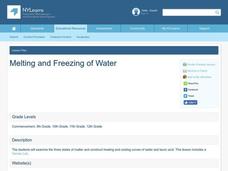Curated OER
Heating and Cooling Curves
Students experiment with a pure substance and a phase change. In this heating and cooling curves lesson plan, students study the effects of heating and cooling a pure substance to observe a phase change. They determine both the melting...
Curated OER
Melting and Freezing of Water
Students examine the three states of matter. They identify the segments of heating and cooling curves. Students analyze data and create a graph to determine the freezing and melting temperature of water.
Curated OER
Melting and Freezing Behavior
Students investigate melting and freezing behavior in substances. In this melting and freezing points lesson plan, students perform experiments to test the impact of various salts on the freezing point of water, they test the impact of...
Curated OER
Activity #15 What Happens To A Liquid As Energy Is Added?
Learners model the arrangement of particles in a liquid. They use the model, to demonstrate how a gas is formed from a liquid with no increase in temperature as energy is added. Pupils model the arrangement and movement of gas particles.
Curated OER
Melting and Freezing of Water
Students differentiate the three states of matter. In this chemistry lesson plan, students analyze graphs of heating and cooling curve of water. They complete a lab report and discuss results.
Curated OER
Iron in Foods
Young scholars determine the amount of iron in a sample of cereal. In this iron lesson plan, students use a computer colorimeter to measure the amount of light absorbed by the solutions. They create a calibration curve using standard...
Curated OER
Ice Ain't Easy
Students are told that objects in contact with one another reach an equilibrium temperature. A hot object placed in a cool liquid always cool off. It never happens that the object gets hotter and cool liquid gets colder. Students predict...








